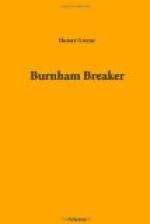“I thought so. Now I want to ask you one or two questions. In the first place, what do you remember about yourself before you went to live with Mr. Craft?”
“I don’t remember anything, sir,—not anything.”
“Haven’t you a faint recollection of having been in a big accident sometime; say, for instance, a railroad disaster?”
“No—I don’t think I have. I think I must ‘a’ dreamed sumpthin’ like that once, but I guess it never happened to me, or I’d ’member more about it.”
“Well, Ralph, it did happen to you. You were riding in a railroad car with your father and mother, and the train went through a bridge. A good many people were killed, and a good many more were wounded; but you were saved. Do you know how?”
Ralph did not answer the question. His face had suddenly paled.
“Were my father an’ mother killed?” he exclaimed.
“No, Ralph, they were not killed. They were injured, but they recovered in good time.”
“Are they alive now? where are they?” asked the boy, rising suddenly from his chair.
“Be patient, Ralph! be patient! we will get to that in time. Be seated and answer my question. Do you know how you were saved?”
“No, sir; I don’t.”
“Well, my boy,” said the lawyer, impressively, pointing his finger toward Craft, “there is the man who saved you. He was on the train. He rushed into the wreck at the risk of his life, and drew you from the car window. In another minute it would have been too late. He fell back into the river holding you in his arms, but he saved you from both fire and water. The effort and exposure of that night brought on the illness that has resulted in the permanent loss of his health, and left him in the condition in which you now see him.”
Ralph looked earnestly at old Simon, who still sat, quiet and speechless, chuckling to himself, and wishing, in his heart, that he could tell a story as smoothly and impressively as Lawyer Sharpman.
“An’ do I owe my life to him?” asked the boy. “Wouldn’t I ‘a’ been saved if he hadn’t ‘a’ saved me?”
“It is not at all probable,” replied Sharpman. “The flames had already reached you, and your clothing was on fire when you were drawn from the car.”
It was hard for Ralph to believe in any heroic or unselfish conduct on the part of Simon Craft; but as he felt the force of the story, and thought of the horrors of a death by fire, he began to relent toward the old man, and was ready to condone the harsh treatment that he had suffered at his hands.
“I’m sure I’m much obliged to ’im,” he said, “I’m much obliged to ’im, even if he did use me very bad afterwards.”
“But you must remember, Ralph, that Mr. Craft was very poor, and he was ill and irritable, and your high temper and stubborn ways annoyed him greatly. But he never ceased to have your best interests at heart, and he was in constant search of your parents, in order to restore you to them. Do you remember that he used often to be away from home?”




